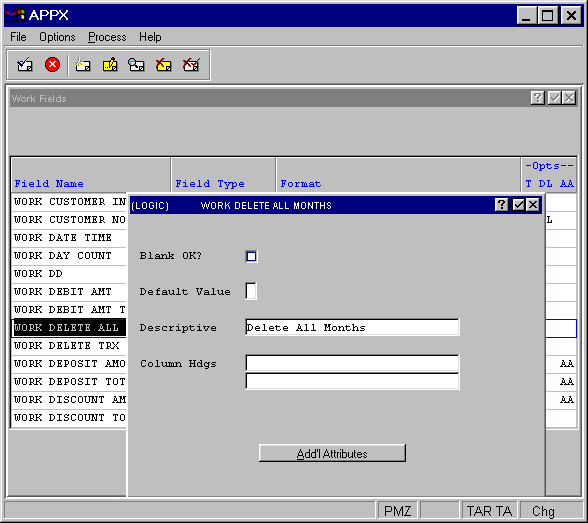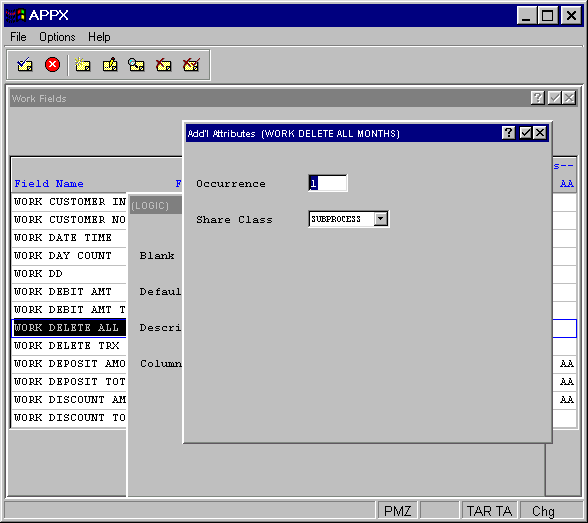


Logic Work Fields
A logic work field has possible values of "yes" ![]() ,
"no"
,
"no" ![]() ,
or "unknown"
,
or "unknown" ![]() .
Examples include various application parameters such as whether or not to post transactions on an accrual
basis, and control work fields that govern the execution of subroutines based upon an exists/does not
exist condition.
.
Examples include various application parameters such as whether or not to post transactions on an accrual
basis, and control work fields that govern the execution of subroutines based upon an exists/does not
exist condition.
The Logic work fields overlay, shown in Figure 2-5-25, permits you to add logic-specific attributes to those already defined for the work field. It automatically displays after you complete the entries on the Work fields specifications screen if the Field Type you select is LOGIC.

Figure 2-5-25. Logic Work Fields Overlay
The Logic work fields overlay contains the following attributes:
·
Blank OK? indicates, for information only, whether a user should be permitted to
leave this field blank on an input image. (Whether or not the field can actually be left blank is controlled
by the image
item specification 'Required?'.) The default is no ![]() .
Click the checkbox to toggle between yes
.
Click the checkbox to toggle between yes ![]() and no
and no ![]() .
.
·
Default Value establishes a starting value for image items whenever they first display
in add mode on an input image, unless modified by a user. If blank, the starting value that displays on
the image is unknown or ![]() .
The Default Value options are blank (default value of unknown or
.
The Default Value options are blank (default value of unknown or ![]() ),
Y (default value of yes or
),
Y (default value of yes or ![]() ),
and N (default value of no or
),
and N (default value of no or ![]() ).
The default is blank.
).
The default is blank.
· Descriptive provides a longer, more easily understood alternative to Field Name, one that is not required to be unique within an application. If blank at all default levels, Field Name is used.
· Column Hdgs designates up to two lines of column heading text. The APPX output process facility uses this text to generate standard column heading images for Start of Page and Start of Range class frames. For cosmetic reasons, the length of headings should not exceed the length of a field itself. Refer to Standard Column Heading Image for additional information.
The Additional Attributes overlay, shown in Figure 2-5-26, is accessible from the Logic work fields overlay.

Figure 2-5-26. Logic Work Fields Additional Attributes Overlay
The logic work field Additional Attributes overlay contains the following fields:
· Occurrence determines the number of times a field is present in a record. If blank, APPX assumes a value of 1. This field may contain up to five numeric characters and is restricted to a maximum of 32,767. See the Occurrence section for a more comprehensive discussion of this field.
· Share Class defines at what level the values contained in this work field can be shared. The Share Class options are:
· SUBPROCESS The values can be shared between a process and its subprocesses.
· RELATED The values can be shared among related processes in a job.
· DETACHED The values are available until the user logs off.
· NOT SHARED The values are available only for the current process.
The default is SUBPROCESS.
APPX Application
Design Manual (01/13/03)



© 2003 by APPX Software, Inc. All rights reserved